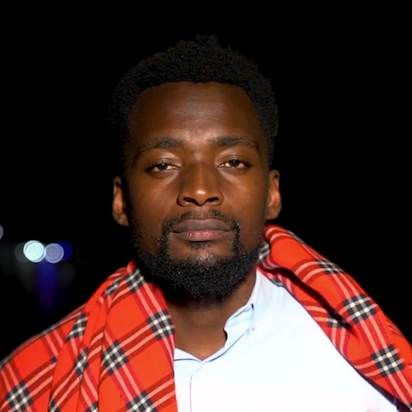Called “Peace begins with me” the poem pays tribute to the strength and resilience of communities affected by conflict as well as those who help them rebuild their lives and livelihoods. It is a reminder of our responsibility to promote peace in our communities, countries and across the world – a conviction that has driven more than two million men and women to serve in over 70 peacekeeping operations since 1948.
“Peace means everything to me” says Pacifique Akilimali, who penned the poem with Nigerian peace activist and poet Maryam Abu Hassan. “The only thing I know since I was born is war… peace has been a dream for a long time now.”
Pacifique, who works in the aviation team at the UN Organization Stabilization Mission in the DRC (MONUSCO), grew up in North Kivu in eastern Democratic Republic of the Congo (DRC), a region affected by decades of violence between armed groups.
“All the wars and conflicts have gotten us nowhere,” adds Maryam, a native of Nigeria’s northern state of Borno where relentless insurgency and violent extremism has plagued people for more than a decade.
It was in this state nine years ago that close to 300 schoolgirls, also known as the Chibok girls, were kidnapped by the armed separatists, Boko Haram. Today, many of them are still missing.
For Maryam, “peace is not just the absence of conflict but also the presence of justice, equality, and respect for human dignity. Everyone deserves to have and find peace.”
Growing up in Goma, North Kivu
“Growing up in North Kivu in the DRC was not easy at all,” says Pacifique.
In 1994, the year he was born, the genocide in Rwanda plunged DRC into one of the deadliest conflicts in the history of Africa. According to the International Rescue Committee, from 1998 to 2007, an estimated 5.4 million people died due to the conflict in the DRC.
“In 1997, I was a refugee with my whole family. My dad and I were captured by a group of rebels, and my dad was about to be shot because some military thought he was in a different ethnic group,” says Pacifique, adding that his father narrowly escaped death when one of the rebel chiefs recognized him and let them go.
“I remember when the UN Mission came to my country and my dad told me that these people are coming to bring us peace.”
In 1999, the UN Security Council established the UN Mission in the DRC (MONUC) to monitor the Lusaka Ceasefire Agreement between the DRC and neighbouring Angola, Namibia, Rwanda, Uganda and Zimbabwe.
More than a decade later, the Council created MONUSCO as an extension of MONUC, widening the new mission’s scope of work to protect civilians, facilitate humanitarian access, and help former combatants disarm and reintegrate into society, as armed conflict persisted particularly in the east.
Over the last 75 years, UN Peacekeeping, a critical global instrument for maintaining peace, security, and stability, has evolved to adapt to the changing political landscape
Speaking of the fortitude of communities in North Kivu who have seen so much violence and suffering, Pacifique says “Goma town is still living. If you come to this town, you will wonder how these people can be happy, sing, dance, love, and hope in such conditions of living. All of us here hope for peace, and we pray for it.”
Finding ways to thrive in Borno state
Maryam feels equally inspired by the strength of the people in Borno state which has been an epicentre of violent extremism and terrorism in Nigeria and across the Sahel region over more than a decade.
Armed conflict, incited by groups like the Boko Haram and the Islamic State West Africa Province, has led to the displacement of an estimated 2 million people today, many of them women and children, who are still unable to return home because of unpredictable attacks against civilians.
“Borno is widely reported to be an area affected by conflict, violence and insurgency,” says Maryam. “What is also true is that there is so much more to us than this singular narrative.”
“Borno is a culturally rich and diverse state, with a vibrant history and traditions that have been passed down through generations. Despite all we have been through, we have found ways to thrive.”
75 years of peacekeeping
Over the last 75 years, UN Peacekeeping, a critical global instrument for maintaining peace, security, and stability, has evolved to adapt to the changing political landscape and nature of conflicts.
What started out as a mission to observe a truce in Palestine in 1948 is now a complex operation of military, police and civilians working together to support communities and countries transitioning from war to peace.
Borno state and eastern DRC are two of the many places that have seen chronic violence that has morphed into complicated conflicts led by multiple armed groups, with mostly civilians bearing the brunt of the devastation and destruction.
Today, nearly 90 per cent of war-time casualties across the world are civilians, says the UN Office for the Coordination of Humanitarian Affairs (OCHA).
Working alongside local communities, peacekeepers today strive to protect civilians, disarm combatants, support political and electoral processes, strengthen human rights and the rule of law, and promote sustainable peace and development.
They are called ‘Blue Helmets’ but they wear many different hats, including as engineers, administrators, legal experts, economists and electoral observers, to help people recover and rebuild their lives, institutions and societies.
Observed under the theme “Peace begins with me” the 75th anniversary celebrates the world’s peacemakers – from peacekeepers, local community leaders to activists – who are the everyday champions of peace.
Maryam and Pacifique’s full poem will be released closer to the International Day of UN Peacekeepers marked on 29 May 2023.




